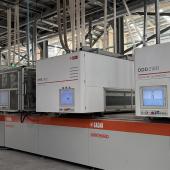Prime Ceramics opens new factory in Nepal designed in collaboration with Sacmi
The new player in the Nepalese ceramic industry will be able to satisfy at least a quarter of the country’s tile demand, which is currently met mainly by imports.
Nepal’s ceramic tile industry has a new player called Prime Ceramics, a company founded by Ashish Garg and Prashant Agrawal with the aim of producing a wide range of high-quality but affordable floor and wall tiles for the local market. It is a large, segmented market that today imports tiles worth more than 15 billion Nepalese Rupees (about €100 million) and offers plenty of opportunity for the growth of a strong local player.
On 30 June in Kathmandu, more than 1,000 people took part in the celebrations to mark the opening of the new factory, designed right from the very first stages together with Sacmi. This fully greenfield plant stands on an approximately 70,000 square metre site in the municipality of Brindavan not far from the Indian border in the south of the country, making it a strategic location for potential future exports.
“Right from the start, our companies worked together with the aim of creating a high-quality plant equipped with the best available technology and therefore capable of producing an excellent product to bring to market,” said Paolo Mongardi, speaking at the opening ceremony together with Prime’s chairman, Ashish Garg, who confirmed the company’s intention to make the new “Prime. Tiles with Stile” brand synonymous with quality.
Sacmi supplied all the key technologies for the plant, including an ATI spray dryer, two PHC 3500 presses for sizes up to 60x120 cm, a 5-level dryer and a 168-metre FCC 295 high thermal efficiency kiln complete with EUC 295 pre-dryer.
For product decoration, a new 12-bar DHD 908 digital printer for wet application of inks and effects was installed together with the glazing system. Sacmi also supplied the sorting, handling and storage lines and the complete dust and flue gas filtration system.
The new plant will have a capacity of around 4 million square metres and will meet at least a quarter of national demand while employing more than 300 people.

Did you find this article useful?
Join the CWW community to receive the most important news from the global ceramic industry every two weeks





















